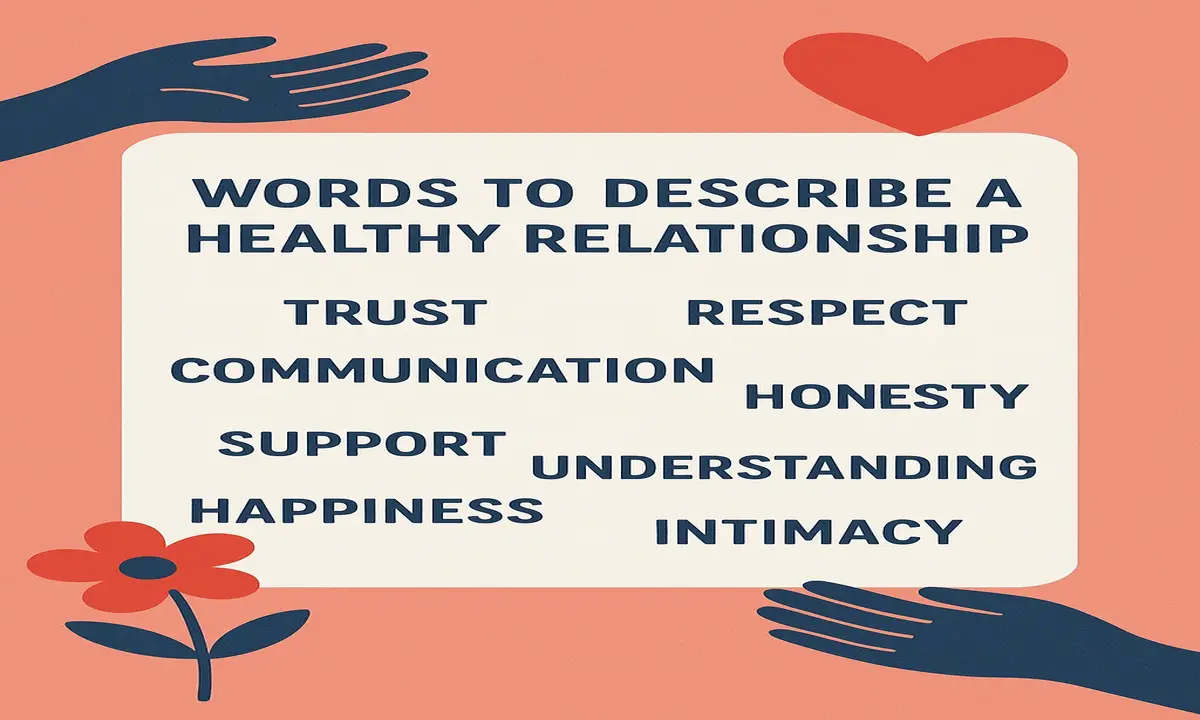Relationships bring joy, strength, and meaning to our lives. A healthy relationship thrives on qualities that nurture trust, respect, and love. Whether it’s with a partner, family member, or friend, these traits create bonds that last.
Understanding the words that define a healthy relationship helps us build stronger connections. Each word we explore is a building block of a great partnership. From honesty to happiness, these terms show what makes relationships work.
They guide us to act with care and intention, creating a space where both people feel valued. This article explains these qualities with clear examples to make them real. Let’s dive into the words that make relationships shine.
Trust
Trust is the cornerstone of any healthy relationship. It means you believe your partner is truthful and reliable. You feel safe sharing your deepest thoughts without fear of judgment.
Trust grows through small acts, like keeping a promise to call or showing up on time. For example, being consistent with plans builds confidence over time.
Building trust requires effort and honesty. It’s about being dependable, even in little things, like remembering a favorite snack. When you’re open about mistakes, like forgetting an errand, it shows integrity.
Trust isn’t built overnight—it’s the result of steady, truthful actions. Without it, doubt can creep in, weakening the connection.
Trust also means being vulnerable. Sharing fears or dreams can feel scary, but it deepens the bond. When both people trust each other, they create a safe haven.
This security lets them face life’s challenges as a team, knowing they’re supported. A trusting relationship feels steady and free from worry.
Positive Words That Strengthen Relationships
| Word/Phrase | Impact on Relationship | Example in Use |
|---|---|---|
| “I appreciate you” | Builds gratitude and validation | “I appreciate you making time for us.” |
| “I’m proud of you” | Fosters confidence and support | “I’m proud of the way you handled that.” |
| “I hear you” | Encourages active listening | “I hear you, and I understand how you feel.” |
| “We’ll figure it out” | Promotes teamwork | “Don’t worry, we’ll figure it out together.” |
| “Thank you” | Reinforces respect | “Thank you for always being there for me.” |
Respect
Respect is treating your partner as a valued individual. It’s honoring their opinions, feelings, and choices, even when they differ from yours.
In a respectful relationship, you listen without interrupting or dismissing. For instance, if they love a hobby you don’t understand, you encourage their passion.
Respect shines in how you handle conflict. Instead of yelling or blaming, you discuss issues calmly. It’s also about accepting boundaries, like their need for quiet time.
Respecting differences—whether in beliefs or habits—creates peace. When both feel valued, they can be themselves without fear.
This quality fosters equality. Nobody feels less important or ignored. Respect means celebrating their strengths and accepting their flaws.
By treating each other with kindness, you build a bond where both thrive. A respectful relationship feels like a partnership built on care and fairness.
Read this blog post: Remembering Ellen Yarnell: A Life of Kindness and Service
Communication
Communication is the heartbeat of a healthy relationship. It’s about sharing thoughts and feelings openly while truly listening. Good communication isn’t just talking—it’s hearing your partner out.
For example, asking about their day and listening shows you care. It prevents misunderstandings and builds closeness.
Healthy communication means tackling issues directly. Bottling up feelings can lead to resentment, but speaking calmly solves problems. If something upsets you, say, “I felt ignored when you were on your phone.”
This opens a conversation, not a fight. Clear communication keeps small issues from growing.
Listening well is key. Nodding, asking questions, or repeating what they said shows you’re engaged. It’s also about being honest without being harsh. Strong communication creates a space where both feel heard and understood. This openness makes tough talks easier and strengthens the bond.
Empathy
Empathy is understanding your partner’s emotions. It’s feeling their joy or pain as if it’s your own. When they’re upset, you don’t just offer solutions—you say, “I can see this is hard.” This shows you care about their feelings. Empathy makes them feel loved and supported.
Empathy shines in tough moments. If your partner is stressed about work, you listen instead of judging. It’s also present in happy times, like sharing their excitement over a goal. Empathy doesn’t mean you feel the same—it’s about validating their experience. This creates a deep emotional tie.
Practicing empathy takes focus. It means putting your thoughts aside to hear theirs. A simple hug or “I’m here” can mean a lot. Empathy reduces arguments by showing you’re on the same side. A relationship with empathy feels like a safe space where emotions are welcome.
Support
Support is being there for your partner, no matter what. It’s cheering their successes, like a promotion, and helping through struggles, like a bad day. Support shows in big ways but also in small ones, like making tea when they’re tired. It’s about showing you’ve got their back.
In a healthy relationship, support is a two-way street. Both people lift each other up, whether chasing dreams or facing fears.
For example, if they want to try a new hobby, you encourage them. Support also means being dependable, like helping with chores. This builds a sense of teamwork.
Support isn’t about fixing everything. Sometimes, it’s just listening or holding their hand. When both feel supported, they face life with confidence.
A supportive relationship feels like a partnership where both grow stronger together, knowing they’re not alone.
Words to Avoid in Healthy Communication
| Negative Word/Phrase | Emotional Effect | Better Alternative |
|---|---|---|
| “You always…” | Creates defensiveness | “Sometimes I feel…” |
| “Whatever” | Signals dismissiveness | “Let’s talk this through.” |
| “It’s your fault” | Breeds blame | “We both play a role here.” |
| “I don’t care” | Shows disconnection | “This matters to me, but I’m upset.” |
| “You never…” | Sparks resentment | “I would like it if you…” |
Honesty
Honesty keeps a relationship real and strong. It’s sharing your true feelings, even when it’s tough.
Being honest means saying, “I’m upset,” instead of hiding it. It’s also admitting mistakes, like forgetting a plan, with kindness. Honesty builds trust and keeps the bond authentic.
In a healthy relationship, honesty is gentle. You share without blaming or hurting. For example, saying, “I need more time together,” starts a talk, not a fight. Hiding things creates distance, but truth brings closeness. Both people feel safe being their true selves.
Honesty also means clarity about needs. If you want more affection, say it directly. This prevents confusion and fosters understanding. A relationship rooted in honesty feels open, with no secrets pulling it apart. It’s a space where both can grow without fear.
Patience
Patience gives a relationship room to grow. It’s staying calm when things aren’t perfect. If your partner needs time to share feelings, you wait without pushing. Patience also means forgiving small errors, like being late, without anger. It creates a calm, safe vibe.
In a healthy relationship, patience helps both people evolve. Nobody’s flawless, and growth takes time.
For example, if they’re working on a habit, you support their effort instead of judging. Patience trusts the process and believes in their heart. This builds a steady, lasting bond.
Patience eases conflict. Instead of snapping in anger, you pause and talk later. This keeps fights from growing. A patient relationship feels like a place where mistakes are okay. Both people can relax, knowing they’re accepted as they are.
Also Visit: CB Cotton: Unveiling the Life and Career of a Top Journalist
Gratitude
Gratitude is noticing your partner’s efforts. It’s thanking them for small things, like cooking dinner, or praising their kindness.
In a healthy relationship, both people feel seen for what they do. A quick “I appreciate you” can brighten their day. Gratitude makes everyone feel valued.
Showing gratitude is easy. A smile, a note, or a compliment works wonders. For example, saying, “You make me happy,” reminds them they matter. Regularly giving thanks keeps the relationship joyful. It also stops you from taking each other for granted.
Gratitude focuses on what’s good, not what’s wrong. Even in hard times, appreciating their effort lifts the mood. A relationship full of gratitude feels warm and connected, like a constant reminder of why you’re together. It’s the spark that keeps love alive.
Important Quote
“The words you speak become the house you live in.” – Hafiz
Boundaries
Boundaries keep a relationship balanced and fair. They’re clear rules about personal needs, like time alone or privacy.
For example, saying, “I need an hour to relax,” sets a boundary. In a healthy relationship, both respect these limits without guilt or pressure. This ensures everyone feels free.
Setting boundaries needs clear communication. You state your needs calmly, like, “Please don’t check my phone.”
Respecting boundaries shows care for your partner’s comfort. It prevents resentment, as nobody feels forced to give up their space. Boundaries create a caring, equal dynamic.
Boundaries don’t mean distance—they mean balance. Both people can be close while keeping their individuality. A relationship with strong boundaries feels secure, with both knowing their needs matter. It’s a partnership where personal growth and togetherness thrive.
Growth
Growth keeps a relationship alive and exciting. It’s when both people inspire each other to be better. For example, supporting a partner’s new career goal shows you believe in them. Growth also happens together, like learning to handle fights better. It makes the bond fresh and strong.
In a healthy relationship, growth is mutual. You cheer each other’s dreams, like taking a class or trying a sport. You also grow as a team, finding new ways to connect, like planning trips. This shared journey makes the relationship meaningful and fun.
Growth needs openness and effort. It means embracing change, like adapting to new life stages. Supporting each other’s goals while staying close creates a vibrant bond. A relationship focused on growth feels dynamic, with both thriving as individuals and partners.
Forgiveness
Forgiveness heals hurts in a relationship. Mistakes happen—nobody’s perfect. Holding grudges builds walls, but forgiving opens the heart. For example, if your partner forgets a date, a sincere apology and forgiveness mend things. It shows you value the bond over pride.
In a healthy relationship, forgiveness is mutual. Both own their errors and forgive without keeping score. It’s not about ignoring pain but working through it. Talking about what happened and moving on rebuilds trust. Forgiveness creates a space where mistakes don’t break the bond.
Forgiveness takes strength and care. It’s choosing love over anger. When both forgive freely, the relationship feels safe and strong. Challenges come, but forgiveness ensures they don’t tear you apart. It’s a key to lasting closeness and peace.
Happiness
Happiness is the light of a healthy relationship. It’s the joy of shared moments, like laughing at a joke or dancing at home. Happiness comes from feeling loved and understood. In a healthy bond, both create fun memories, like a surprise outing or a cozy night in.
Happiness doesn’t mean every day is perfect. Even in tough times, small acts, like a warm hug, bring joy. Both partners nurture happiness by being present and playful. For example, planning a walk together lifts spirits. Happiness makes the relationship a source of comfort.
Happiness grows when traits like trust and gratitude are strong. It’s the result of feeling safe and valued. A relationship filled with happiness feels like home, where both can be their best selves. It’s the spark that reminds you why the bond is special.
Importance of Positive Words
Positive words act like emotional anchors in a relationship, creating a safe and nurturing environment. When you express appreciation, gratitude, or encouragement, your partner feels validated and valued.
This consistent use of affirming language builds trust, strengthens emotional intimacy, and reduces conflict over time.
Moreover, positive words shape the way couples navigate challenges. Instead of focusing on blame, phrases like “We’ll figure this out” emphasize teamwork and resilience.
By choosing supportive language, you foster a growth-oriented bond where both partners feel empowered. In 2025, with digital distractions rising, using intentional, uplifting words remains a timeless tool for healthy communication.
conclusion
Words carry immense weight in shaping the direction of any healthy relationship. The way you choose to express love, gratitude, or even frustration directly impacts how safe, valued, and connected your partner feels.
Positive words like “I appreciate you” or “We’ll figure this out” can act as powerful tools for building trust, while negative phrases such as “You never listen” or “It’s your fault” can weaken the foundation of respect.
Ultimately, identifying and using the right words is more than a communication strategy—it’s an act of love.
By choosing affirmations over accusations, encouragement over dismissal, and unity over division, couples can strengthen their emotional bonds and build lasting partnerships.
Remember, the heart of a healthy relationship lies not only in what you do, but in the words you choose to say every single day.
FAQs
What makes a healthy relationship?
A healthy relationship has trust, respect, and open communication. Both people feel supported, valued, and free to grow. Traits like empathy, honesty, and forgiveness keep the bond joyful and strong.
Why is trust so important?
Trust creates safety and security. Without it, doubt and fear can weaken the bond. Reliable actions, like keeping promises, and honest words build trust that lasts.
How do boundaries help a relationship?
Boundaries ensure balance and respect. They let each person maintain needs, like personal space, preventing resentment. Clear boundaries foster a fair, caring partnership.
Why is communication key?
Communication builds understanding and closeness. Sharing feelings and listening well prevents conflicts and deepens the bond. Honest, kind talks keep the relationship strong.
How can I show gratitude daily?
Small gestures like saying “thank you,” leaving a note, or praising efforts show gratitude. Regular appreciation makes your partner feel seen and loved.
Can a relationship last without forgiveness?
Forgiveness is vital for healing mistakes. Without it, grudges grow, creating distance. Forgiving sincerely rebuilds trust and keeps the relationship resilient.












